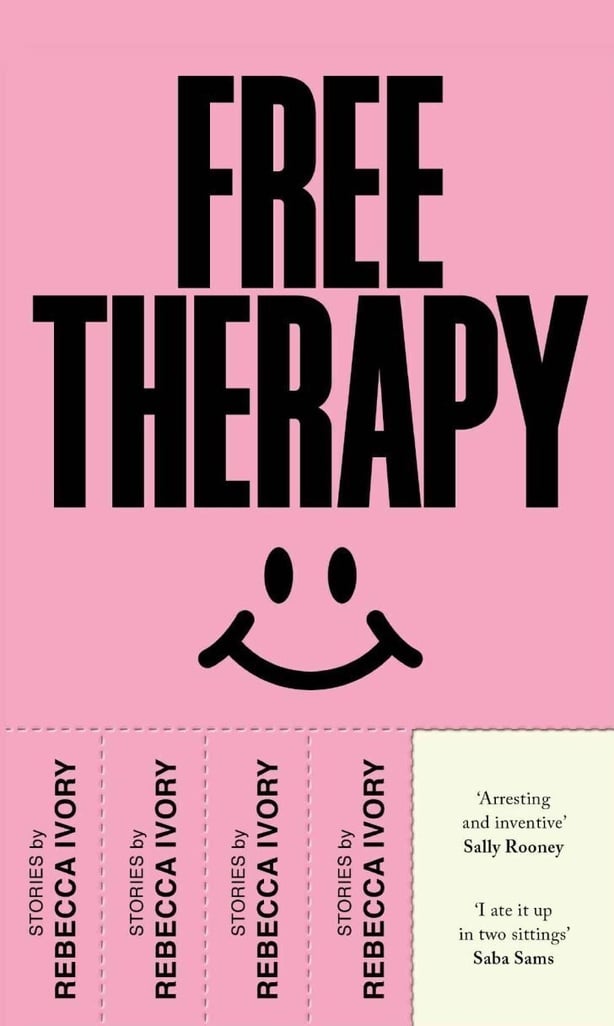Losing yourself in a book is a distinct pleasure, rarely found. But finding yourself in a book is rarer still, and – when done well – pretty unnerving.
This is what Rebecca Ivory has hit on with her debut collection of short stories, Free Therapy. Its nine stories about everyday people enduring the anxieties of life with at least some knowledge of the lessons of therapy, but often unable to put them into practice, are flinty, almost unbearably familiar vignettes of modern life.
In Lines to Keep, a widower tries to connect with his daughter as she progresses through college and part time work, both of them struggling to transition to new phases of their lives. In Push and Pull, two teenage girls, repulsed by their "excessive" femininity and growing bodies, agree to lose weight together, kickstarting a furious and exacting regime of starvation and exercise.
Accounts of craning in front of mirrors and the bluntness of teenage girls will no doubt hit almost uncomfortably close for many readers, a common theme in the collection. Ivory's dexterity with her characters shines through most in this story, so it’s not surprising that it opens the collection.
As compelling as these stories can be, there are facets that are left underdeveloped. We’re told that Jamie, the daughter in Lines to Keep, used to chase after her mother’s affections before she died, "a delicate endeavour in which she often failed". This scant glimpse at their old life made me long to hear more, and the same rang true for Josephine, the cult-y leader of the women’s development group in Free Therapy, the title story.
What Ivory captures especially well is the subtlety of power dynamics in both romantic interactions and those strange, unnameable encounters we have with strangers. Ivory’s own understanding of the mind and the endless spirals it can trap us in are well explored in how common they are.
In the title story, Alison and Ritchie - a fintech salesman "obsessed with productivity" - argue about whether she’s "luring him into mediocrity" with her passive approach to everything but money and getting his attention.
Told in a clean, crisp prose laced with razor sharp analysis of both the characters and their environments, at their best these stories are bracingly fresh.
When their relationship sours (more than once), Ivory gives us a layered exploration of ambition, and how finding a life’s purpose can be a way of mitigating rejection and heartbreak. She also doesn’t shy away from allowing her characters to be messy and unpleasant. Having improved her life in the wake of her breakup, Alison confesses that "the changes I had made lost their meaning when I realised that they were only significant if other people noticed them, which they rarely did".
With such a clear focus on the mundane experiences many of us go through, some stories can feel too similar to each other. By the time we come to Settling Down, a story about a woman becoming fixated on the man sent to clear mould from her and her partner’s rented flat, I was longing for something a bit unusual, which it certainly provides.
Cliona, the protagonist of this story, is interesting in how we watch her put her people reading skills to work, sizing up Leo, the towering, sallow-skinned mould expert come to rescue them from the hell of a damp apartment. "But isn’t he wasted in his day job?" She asks Ben, her boyfriend, entranced by Leo’s charisma. "Shouldn’t he be on stage or television?"
Undercutting this is a commentary on the inequalities of the rental market and how the stakes can be higher for one person in a relationship than for the other. "She knew he didn’t have a plan, just the assurance that he could go back to his parents", she thinks about Ben. Finally, a misjudgement by one character upends not only her perception of Leo, but of her relationship itself.
Told in a clean, crisp prose laced with razor sharp analysis of both the characters and their environments, at their best these stories are bracingly fresh. However, the language can come across as unrealistically clinical at times, such as in Free Therapy, the title story, when one character, contemplating her is-he-isn’t-he boyfriend’s behaviour during sex, tells herself that "parameters for normality in sex couldn’t be prescribed".
Although laying a character’s thought processes bare can spoil some of the joy of figuring them out for the reader, these stories are impeccably well-observed, told with a frank directness that can only come from a writer with a keen understanding of her subject matter. The plights these often stagnated characters plough through are small, petty and mundane, and Ivory manages to find the universal and heart-rending in them.

Free Therapy is published by Jonathan Cape


